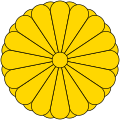Emperor Suzaku facts for kids
Quick facts for kids
|
|||||
|---|---|---|---|---|---|
| Emperor of Japan | |||||
| Reign | October 16, 930 – May 23, 946 | ||||
| Coronation | December 14, 930 | ||||
| Predecessor | Daigo | ||||
| Successor | Murakami | ||||
| Born | September 7, 921 Heian Kyō (Kyōto) |
||||
| Died | September 6, 952 (aged 30) Heian Kyō (Kyōto) |
||||
| Burial | Daigo no misasagi (醍醐陵) (Kyōto) | ||||
| Issue | Empress Masako | ||||
|
|||||
| House | Yamato | ||||
| Father | Emperor Daigo | ||||
| Mother | Fujiwara no Onshi | ||||
Emperor Suzaku (
Contents
Emperor Suzaku's Early Life
Before he became emperor, his personal name was Hiroakira-shinnō. He was also known as Yutaakira-shinnō (
Hiroakira-shinnō was the eleventh son of Emperor Daigo. His mother was Empress Consort Onshi. She was the daughter of Fujiwara no Mototsune, who was a powerful regent and minister.
Emperor Suzaku had one daughter, an Imperial princess.
Key Events During Suzaku's Reign
Suzaku became emperor because his older brother and his brother's son died unexpectedly. This opened the way for him to take the throne.
- October 16, 930: Emperor Daigo, Suzaku's father, stepped down from the throne. His eleventh son, Hiroakira-shinnō, became the new emperor. This event is called the senso (succession).
- December 14, 930: Emperor Suzaku officially took the throne in a ceremony called the sokui. He was only eight years old at the time.
- May 16, 931: The name of the era was changed to mark the start of Suzaku's reign.
- August 5, 931: The former Emperor Uda passed away at the age of 65.
- 933: Fujiwara no Nakahira was appointed udaijin, which means Minister of the Right. He was the brother of the regent, Fujiwara no Tadahira.
- September 7, 936: Fujiwara no Tadahira became the daijō-daijin (Prime Minister). Other important ministers were also appointed around this time.
- 938: There were many small earthquakes in Heian-kyō (modern-day Kyoto) over several days.
- 940: A major rebellion happened in the Kantō region. Taira no Masakado declared himself the "New Emperor." However, his forces were defeated, and he was executed.
- 941: Another rebellion was led by Fujiwara no Sumitomo. He had secretly agreed with Taira no Masakado. His army was also defeated.
- May 23, 946: Emperor Suzaku stepped down from the throne after ruling for 16 years. His younger brother became the next emperor, known as Emperor Murakami.
- 952: Suzaku became a Buddhist monk at Ninna-ji temple.
- September 6, 952: Suzaku passed away at the age of 30.
Emperor Suzaku's Burial Place
The exact location of Emperor Suzaku's grave is known. He is traditionally honored at a memorial Shinto shrine called a misasagi in Kyoto.
The Imperial Household Agency manages this site. It is officially named Daigo no misasagi. It is located in Fushimi-ku, Kyoto, near the Buddhist temple Daigo-ji.
Important Court Officials (Kugyō)
Kugyō (公卿) was a special term for the most powerful men in the emperor's court before the Meiji period. This small group usually had only three or four men at a time. They were nobles who had reached the highest positions in their careers.
During Emperor Suzaku's reign, some of these top officials included:
- Sesshō (Regent) and Kampaku (Chief Advisor): Fujiwara no Tadahira.
- Daijō-daijin (Prime Minister): Fujiwara no Tadahira.
- Sadaijin (Minister of the Left): Fujiwara no Tadahira and Fujiwara no Nakahira.
- Udaijin (Minister of the Right): Fujiwara no Sadakata, Fujiwara no Nakahira, Fujiwara no Tsunesuke, and Fujiwara no Saneyori.
Eras of Suzaku's Reign
In Japan, years are often grouped into periods called era names or nengō. Emperor Suzaku's reign included these eras:
See also
- Emperor of Japan
- List of Emperors of Japan
- Imperial cult
- Emperor Go-Suzaku
| Regnal titles | ||
|---|---|---|
| Preceded by Emperor Daigo |
Emperor of Japan: Suzaku 930–946 |
Succeeded by Emperor Murakami |
 | Misty Copeland |
 | Raven Wilkinson |
 | Debra Austin |
 | Aesha Ash |


